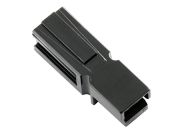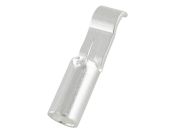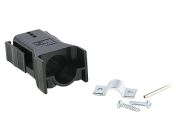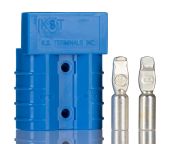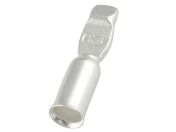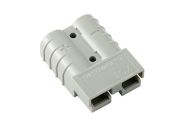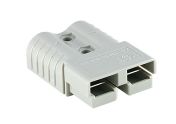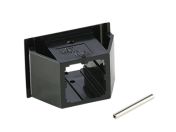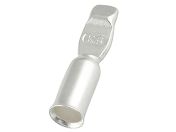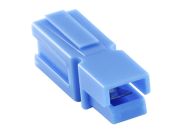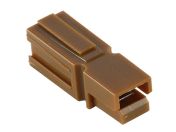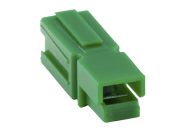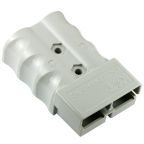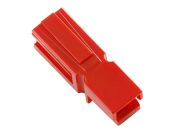- Automation & Control Gear
- Cables & Wires
- Enclosures & Server Racks
- Fuses & Circuit Breakers
- HVAC, Fans & Thermal Management
- Lighting
- Relays & Signal Conditioning
- Switches
- Batteries & Chargers
- Connectors
- Displays & Optoelectronics
- ESD Control, Cleanroom & PCB Prototyping
- Passive Components
- Power Supplies & Transformers
- Raspberry Pi, Arduino, ROCK, STEM Education & Development Tools
- Semiconductors
Battery Connectors
Battery connectors are essential interconnection components used in any application requiring a battery or rechargeable power source. These connectors facilitate a reliable electrical connection between the battery and the device it powers. They are therefore used in a wide range of portable units and stationery equipment, such as the automotive industry, laptops and computing, as well as in-field medical and test equipment.
How Do Battery Connectors Work?
Battery connectors are designed to ensure a secure and efficient flow of power. Key features include:
- Polarisation: Many battery connectors incorporate polarised designs (e.g., keyed housings, distinct terminal sizes) to prevent reverse polarity connections, which can damage the battery or connected device.
- Secure Mating: Battery connectors, such as auto connectors for use in cars, often use locking mechanisms or friction fits to maintain a reliable connection, even under vibration or movement.
- Durable Construction: They are typically constructed from robust materials that can withstand repeated use, temperature variations, and environmental factors.
- Colour-coded Housings: Some battery connectors use colour-coded housings to visually indicate voltage levels or prevent mismatched connections.
- Stackable Design: Certain battery wire connectors are end-to-end stackable, offering flexibility in battery pack configurations.
Why Use Battery Connectors?
Battery connectors are not just helpful for rechargeable battery applications. They can be used as either compression or sliding modular contacts, modular battery contacts can also function as connectors for many other non-battery related applications. They're made with a high-performance and temperature-rated thermoplastic housing, durable blade terminals and can be manufactured with a variety of metal plating finishes, such as gold-plated nickel contacts.
Types of Battery Connectors
Here's a breakdown of the different types of battery connectors:
Ring Terminal Connectors
These are circular connectors that attach to battery posts using a screw or bolt. They offer a high-current capacity and secure connection, commonly used in automotive and industrial applications.
Quick Connect/Disconnect Connectors
Designed for easy and rapid connection and disconnection, ideal for portable devices or applications requiring frequent battery changes. You might find these connectors in a car battery where quick swapping is necessary.
Blade Connectors
These battery connectors use flat, blade-like contacts, offering a secure and reliable connection. They are frequently found in automotive applications such as a car battery wire connector.
Terminal Post Connectors
These connectors are designed to fit over threaded battery posts, providing a stable connection.
Alligator Clips
Spring-loaded clips that provide a temporary connection to battery terminals. Useful for testing or jump-starting a car battery.
Anderson Powerpole Connectors
These genderless connectors are known for their high current capacity and durability, often used as auto battery connectors or in industrial applications.
Waterproof Connectors
Waterproof battery connectors are designed to protect the connection from moisture and dust, crucial for outdoor or harsh environments.
How to Choose a Battery Connector
Consider these factors when choosing a battery connector for your application:
- Connector Type: Match the connector type to the application and the type of battery terminal.
- Current Rating: Ensure the connector can handle the maximum current draw of the application.
- Voltage Rating: The connector must be rated for the voltage of the battery system.
- Wire Gauge Compatibility: Choose a connector that accommodates the wire gauge being used. This is especially important for car battery wire connectors or car battery cable connectors.
- Environmental Conditions: Consider temperature, moisture, and other environmental factors. Look for durable materials and features that enable the battery connector to operate in their intended environment, such as a waterproof battery connector for outdoor installations.
- Ease of Installation: Select a connector that is easy to install and use, especially if frequent battery changes are required.
- Safety Features: Ensure the connector has safety features such as locking mechanisms or polarised connections to prevent accidental disconnection or incorrect mating.
How to Maintain Battery Connectors
Proper maintenance will ensure the longevity and reliability of your battery connectors:
- Keep Connectors Clean: Regularly clean connectors to remove dirt, debris, and corrosion.
- Inspect for Corrosion: Check for signs of corrosion and clean or replace connectors as needed.
- Ensure Connections are Tight: Regularly tighten and secure cables or wires to prevent loose connections and arcing.
- Use Anti-Corrosion Spray: Regularly apply an anti-corrosion spray to protect connectors from corrosion, especially if they are housed outdoors.
- Check for Wear and Tear: Inspect connectors for wear and tear during routine maintenance and replace them as needed.
- Protect from Moisture: Keep connectors dry and protected from moisture, especially if they are not waterproof.
- Use Heat Shrink Tubing: Use heat shrink tubing to protect connections and prevent moisture from entering.
- Avoid Over-tightening: Avoid over-tightening connectors as this can damage them or prevent normal operation. Always follow the manufacturer’s specified torque.
- Regularly Test Battery Connections: Periodically test battery connections as part of routine maintenance to ensure they are functioning correctly.
Waterproof Battery Connectors
Waterproof battery connectors are specifically designed to safeguard electrical connections in environments where exposure to moisture, dust, and other contaminants is a concern.
These rugged connectors for batteries are essential for ensuring reliable performance for critical equipment or infrastructure in harsh conditions such as marine or outdoor applications. Waterproof connectors prevent corrosion, short circuits, and other issues that can arise when components are exposed to the elements.
Waterproofing can be achieved through several design features, including:
- Sealed Housings: Connectors often feature sealed housings made from materials like rubber, silicone, or durable plastics to prevent water ingress.
- O-Rings and Gaskets: O-rings and gaskets are used to create watertight seals between connector components.
- Potting: Encapsulating the connector with a potting compound provides an additional layer of protection against moisture and contaminants.
- IP Ratings: Waterproof connectors are typically rated according to the IP (Ingress Protection) code, which indicates their level of protection against solids and liquids.
Industrial Applications of Battery Connectors
Battery connectors play a vital role in a wide range of industrial applications, from the car battery connector in your vehicle to the high-power connections in industrial machinery. Here are some key sectors where they can be found:
- Automotive Industry: Auto battery connectors provide power for starting, lighting, and powering all electrical systems in a car or other vehicles.
- Renewable Energy (Solar, Wind): Battery connectors are used in solar panel installations, wind turbines, and energy storage systems to connect batteries and inverters for efficient power transfer.
- Electric Vehicles (EVs): EVs rely heavily on high-current battery connectors for connecting battery packs to motors and charging systems.
- Aerospace and Defence: Aircraft use battery connectors for starting systems and emergency power, demanding high reliability and resistance to extreme conditions. Spacecraft also employ specialised battery connectors designed for vacuum, radiation, and temperature extremes, powering critical systems.
- Telecommunications: Backup power systems in telecommunications networks rely on battery connectors to ensure uninterrupted service.
- Power Generation and Distribution: Battery connectors are used in power plants and substations for backup power and control systems.
- Construction and Heavy Machinery: Heavy machinery often uses large battery connectors for starting engines and powering auxiliary systems.
- Marine Industry: Waterproof battery connectors are essential for boat and ship power systems, protecting connections from moisture and corrosion while powering navigation and lighting.
- Electric Power Storage Systems: Large-scale battery storage systems rely on robust battery connectors for connecting individual battery modules.
- Medical Equipment: Medical devices often use battery connectors for portability and backup power.
- Consumer Electronics: Portable devices like laptops and smartphones use miniaturised battery connectors for charging and battery replacement.
Shop Battery Connectors at RS Malaysia
RS is a trusted supplier of high-quality battery connectors in Malaysia. From car battery connectors to specialised industrial battery power connectors, shop from top brands like Anderson Power Products, RND, TE Connectivity, and more. We also carry alternative mains and DC power connectors like IEC connectors, RCD plugs, and more. For details on delivery times, and delivery information visit our Delivery Page.


